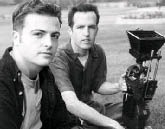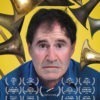
Getting the Greenlight
Written by Emily Jansen | Posted by: Anonymous
At a time when financing your film can seem increasingly difficult, it is always encouraging to hear a success story. On January 18th, 2003, two New England filmmakers, Kyle Rankin and Efram Potelle, were selected as the winners of this year’s Project Greenlight Director Contest. In its second year, the contest, conceived by producer Chris Moore and Boston’s own Oscar-winning writer/actors, Matt Damon and Ben Affleck, selected its second feature screenplay from submissions by amateur screenwriters, to be produced by LivePlanet and Miramax Films. This year, Project Greenlight also introduced a Director Contest that was conducted simultaneously. Winning directors Potelle and Rankin were selected out of thousands of contestants and then given the opportunity to direct the winning screenplay, "The Battle of Shaker Heights."
Needless to say, in the past few months, life has changed somewhat dramatically for these two filmmakers, both of whom hail originally from Maine. Besides being afforded the opportunity to direct a one million dollar feature film, these two directors are also getting an extended view of life on the other side of the lens. As with the previous Project Greenlight winner, HBO is filming "the making of" the movie as a documentary series to air beginning this summer.
Between their own hectic production schedule and the demands of being filmed by the HBO crew, tracking down these directors was no easy task. Fortunately, NewEnglandFilm.com caught Kyle Rankin in early April, just after he had finished several intense weeks of production for "The Battle of Shaker Heights." Rejuvenated from a few days off and emanating with excitement, Rankin had much to share about his recent success.
EJ: Tell me about how you got started in the filmmaking industry? And how did you come to meet Efram?
Rankin: We owe our partnership and collaboration to this great festival called the Maine Student Film and Video Festival, run by this guy James Coleman that everybody calls Huey. It wasn’t until I was a freshman in high school that I discovered the festival and I think Efram discovered it when he was in 7th or 8th grade. We were actually competitors in the festival because I was in York, Maine, which is southern, and Efram was in Fairfield, Maine, which was central. So we competed for a long time and it always seemed like we were flip-flopping. He would win best of festival one year and I would be runner-up and then the reverse of that the next year. We got to know each other but never really talked.
Then, when we were about 20, I was in college and he was still living in Fairfield, and Huey asked us to collaborate on something — a compilation video that he was making called the Best of 15 Years of the Maine Student Film and Video Festival. Efram was going to edit it and he wanted me to host it, and he wanted the two of us to come up with these interstitial comedic skits that would be peppered throughout the hour. That was when we first started collaborating. It kind of occurred to us both that "wow" that was really fun and we have similar ideas.
It was at that point that Efram was in his first semester at U-Maine in Orono and it was actually my last but during that semester we produced a feature length video called "DORM" which was this really bad murder mystery where I played an FBI agent sent in posing as a student… We learned so much — it was all consuming.
EJ: And I know you continued collaborating on numerous other projects. "Reindeer Games" generated quite a bit of notice for you in your home state.
Rankin: Yes, it was the first feature length production made in Maine by Mainers. Ironically enough it was called "Reindeer Games" several years before the Dimension release "Reindeer Games." We hated that when we heard a movie called "Reindeer Games" was coming out because we were busy trying to get our film noticed. It started as a short film idea that I had and the title "Reindeer Games" actually just came from an early piece of dialog that was in the script. It was myself and Efram and our friend Shayne Worcester — the three of us produced the movie on absolutely no money.
Mostly this film put us into a severe state of depression. We finished it and thought "all right, now we will send it to Sundance and the rest is history." And we didn’t get into Sundance and we had a very hard time having anyone see the movie. And when they did they were like, "God that was very depressing." We made a very heavy movie, a very artsy movie and I think that is when we learned the lesson that movies are supposed to be entertaining. I think we were asking a lot of the audience in that movie. A lot of people were really touched by it in a good way, but we had a hard time getting anyone to see it that was influential and could help us make another one. What started happening after "Reindeer Games" was that we started producing movies that were shorter and shorter. The next thing Efram and I did was called "Pennyweight" which was a short film also on 16mm that was 40 minutes long — they call it a feature short — and that was a really fun experience.
EJ: How would you describe you and Efram’s working relationship? Do you both always co-direct, co-write, and co-produce?
Rankin: What we were up until Project Greenlight was co-producers, co-directors, sometimes co-writers. For the most part for the things that we made in Maine, I was usually producer, writer, actor; he was kind of producer, sometimes co-director, sometimes writer, always post-production guy. It kind of ebbs and flows. There is no real set definition for what we do. I think in general Efram is far more technically minded than I am. I tend to be maybe a little more creative-minded, but I always look to him to ask "is this something we can do technically" or "is this gonna work." He has a great mind for post, and how things are cut together, and the shots that we need. But we can both kind of do anything on set.
EJ: How did you get from Maine to LA?
Rankin: Basically, I never wanted to come out to LA unless we were in a sense invited to LA. Maine is a great place to be and we always managed to raise a little bit of money to combine with our money to make our shorts. And it is just a wonderful place to get people really jazzed up because there is still a real excitement around filmmaking that there isn’t [in LA]. There is more of a hardened "yeah, yeah you are making a movie" out here. Basically, I was waiting tables for almost six years in Portland. I mean a big impetus to come out here was just realizing that I did not want to be a 30-year old waiter and I was desperately close to being a 30-year old waiter. But "Penny weight" did really well for us and we traveled around with it. It won a few best short film awards and after that we made "They Came to Attack Us" which was only 7 minutes long and that did really well for us too.
We were always scheming about how to get noticed from Portland, Maine, and we had the bright idea to just focus on one person. Picking someone in Hollywood that we admired and kind of liked and had some kind of connection to — even if only it was a real minute one — and make something for them. Shayne had always talked about JJ Abrams [creator of ABC’s "Alias"]. I wrote JJ a letter, sent him "Pennyweight," and sent him a packet telling him that we were in Maine making movies. I think I just said I was making contact. He called about a week later to say congratulations and he was very open and friendly and offering advice or if there was anything he could do. I ended up asking if I could come out and shadow a director on the set of "Alias." So I did that. I came out for about 10 days and worked on episode 8, and it was about the third day that I got this idea that when I returned home I would try to talk Efram into doing a spoof of "Alias." The first season I thought was just so ripe to be spoofed.
When I came back we actually took two weeks and wrote a fifteen-page script and it took about 2 months from beginning to end to produce the spoof. We FedExed it to JJ and he called the next day. He was very complimentary. That was also a great impetus to make the move — just the idea that we had made something that JJ was crazy for and that he was clearly impressed by. So we came out and we were only here for about 5 months before the 2nd Project Greenlight started.
EJ: What were you two doing in LA when Project Greenlight started? How do you go about entering the contest?
Rankin: At the time Efram was working at a digital post-production house editing and doing graphics and digital effects and I was actually landscaping. What they had you do for Project Greenlight was put a 3-minute clip of your work on the web. So we put 3 minutes of "Pennyweight" and 3 minutes of "They Came to Attack Us." Through every hurdle of the project — we were in the top 250, then the top 50, then the top 10 — we were always amazed that we were coming down. I think right around the top 50 we started being like "wow" this could really change our lives — which it ended up doing.
EJ: It’s quite an accomplishment just to get to the first round of 250…
Rankin: Yeah, yeah that was. That was what everyone said to us but we were like "whatever." We want to win. I think at this point we had been struggling for so long that we were just like it’s not an honor it’s nothing unless we win. (laughs) There was a hint of desperation over the past couple of years.
EJ: I’m still curious about the Project Greenlight contest. This is highly competitive process and you came out on top. What are the steps of the process — the selection criteria?
Rankin: At 250, they sent some instructions on what they were looking for — a thing that they called a bio video which was to be no more than 3 minutes long and was supposed to introduce yourself to the panel. They get 250 bio videos and at this point the panel hasn’t even seen any of the actual work because what gets you into the top 250 it what is called "peer review." The peer review process has come under a lot of fire but I actually think it was a good process. With the volume of work [submitted] it would just take a committee so long to go through it. We got a lot of nice comments on our stuff and some really good, thoughtful critique. I do think that the people that were the contestants were trying to be fair. I know that we did try to be fair as well.
So we submitted the bio video. We wanted to be noticed but at the same time we did not want to really set anything up. We wanted it to be memorable. They said take your time, have fun, don’t go out of your way to make something really amazing but at the same time they say that your bio video will be used as a barometer for how good of a director you are. So you are like how do I introduce myself and my life and also show them that we are worthy of being directors? What we came up with was kind of a very straight bio video but the last 20 seconds has this eye-popping video effect that I think ended up turning a lot of heads — and I think helped us frankly win the whole thing.
That got us down to the top 50. Then we did nothing for the top 50 except for we filled out a questionnaire that we sent in because they said they were going to use the questionnaire, your bio video, and now the committee was finally going to look at your original scenes, and they were going to use all of that information to pick a top 10. About a month later we got the call that we were in the top 10. And then they totally through a curve ball at everyone because they sent a 2 1/4 page script that was completely ambiguous. You had no idea what was going on or who the characters were or where it was taking place and you had to basically — using all of the lines verbatim — you had to make some sense out of it. They were really hard lines and it was a really great challenge.

From right to left: Kyle Rankin, Chris Moore, Erica Beeney (screenwriter), Efram Potelle, Ben Affleck, and Matt Damon.
[Click to enlarge]
EJ: How did you find out you won?
Rankin: They called to tell us. We sent in all of our stuff and then Chris Moore ended up calling about a month later. He was like "Hey, you guys are in the top 4." He said it’s supposed to be a top 3 but they couldn’t decide so they’re sending 4 people to Park City [Utah]. And the deal with Park City was that we were there for 5 days, they paid for everything, it was the 10 writer finalists and us. They had gotten 7,200 screenplays down to 10. And part of our top 10 assignment along with making our video was to actually read the top 10 scripts and do coverage on them and let the panel know what were our favorites. In Park City it was all of these interviews with HBO. It was the first time we actually met HBO and when taping began.
They made the announcement and it was really cool because our moms we there. They made the announcement and all of the sudden we were up on stage with those guys [Matt, Ben, and Chris] and doing a bunch of press and it was kind of this whirlwind for about an hour. And then we were downstairs and Chris Moore said he needed to talk to us and it was really cool because he sat myself and Efram and Erica [Erica Beeney, winner of the Screenplay Contest] down and just started going over what the next 8 months were going to look like. And that is when we realized how compressed the schedule was because this was January twenty-something and he’s like "OK the movie is going to open up in theaters Aug 15th." That is why everything has been so condensed. They realized what the mistake was last time — that the movie actually came out in theaters over 2 months after the HBO series had already stopped. The movie will open in theaters Aug 15, a Friday. Two days later on Sunday the second-to-last episode of the 13 episode series will air. So they are combining the two, which is really great.
EJ: Tell me about the film you are working on, "The Battle of Shaker Heights." How do you feel about the script? How do feel about working on something you haven’t written yourself?
Rankin: Yes, that was a real change. Basically, it was really cool because we couldn’t have gotten a script we liked more. When we read the top 10, for my money and definitely for Efram too, it was the clear one that we wanted to work on. It had a lot of heart. It was funny. It was dramatic. It was sweet. It was kind of all good things. I actually read all top 10’s before Efram did and told him there was only one I liked, and I didn’t tell him which one. He read them as well and then came back to me and said "Battle of Shaker Heights" and I said yes. So we were really on the same page there. And that was good because I think being very clear helped us in front of the panel. We basically fought for "Battle of Shaker Heights."
EJ: What have been your biggest challenges on this project so far…
Rankin: I think just the scope of it as far as the number of crew. I would also say the biggest challenge is probably having the entire thing documented. Directing can be kind of an intimate process and it is a process too. The hardest thing is to have every stage of the process recorded.
We had a hard time casting this movie because a lot of people that we went after would come and say that they enjoyed the script, but that given what happened with the last Project Greenlight they weren’t going to do it. The good thing is that the HBO producers are completely different this year and they are definitely more into showing some of the triumphs as well as the failures. The first [HBO] series was certainly focused on the failures.
EJ: How closely were the HBO film crews following you? Were there any times when you were allowed to say "no" we don’t want to be filmed right now?

A still from "The Battle of Shaker Heights" to be released in August 2003.
[Click to enlarge]
Rankin: Not really. There were only maybe a handful of times on the set when we really needed to talk, when we really needed to have an intimate, authentic exchange with an actor if we weren’t getting through to them or they were having a really hard time with the [HBO] cameras. But we could never really be like "back off" because contractually we signed that they could be there. We a couple of times went to Chris Moore and whenever Chris thought that we needed to do something privately for the good of the movie he would always have them back off and I thought that was really good. There were a few rehearsals that we asked them to leave. And that was towards the end, I think, when people could feel that the movie was going well and they knew that we had a few days with dramatic scenes where we just wanted some privacy. So we really tried to push for that towards the end.
EJ: Was it weird for you to be on the other side of the camera?
Rankin: It was weird more so in terms of interpersonal relationships than actually being in front of the camera. Efram and I were kind of always engulfed in video and film in a way that we were always pointing video cameras in each other’s faces. We also had for five years a public access show in Portland, and it was basically two guys sitting there with a big lens in our face and we took calls and it was kind of a show about nothing. We would kind of talk and take calls and always some topic would enter the room and we would just start talking about it. So we were kind of used to lenses staring us in the face.
It was funny because they [HBO] told us right off the bat that there was a line they didn’t want to blur. Basically they were like "try not to talk to the camera people, or the sound people, or the crews. They’ve been instructed not to talk to you." They said no one will think that anyone else is being rude because they all know about this but it was just funny because inevitably I started to know everyone’s name and so did Efram. And it was some of my favorite times were when Efram and I, which we have always done on set, would be blowing off some steam and riffing on something and making each other laugh and it was always fun and kind of satisfying to see an HBO camera bouncing up and down knowing that the guy was laughing. That was really fun. Now there is only one crew on post-production, which is just so much more manageable. We know the camera guy Steve and the sound guy Keith and its fun because the line has been completely blurred. And now, HBO has decided to make that a part of the show because how could they not? I think it is really important — there is such a surreal dimension to this process.
EJ: And what is in the future after Project Greenlight wraps up?
Rankin: I have no idea. I really don’t know.
EJ: What would you like to see happen?
Rankin: One thing I have been doing lately is just spending time writing. I would like to see Efram and I directing something that we’ve written.
EJ: Do you have any future plans in New England?
Rankin: We would like to come back and see friends and family. I don’t know. California still doesn’t feel like home. I still call Maine home.
EJ: One final question. You and Efram have come a long way. How does success feel?
Rankin: Honestly, I guess it just feel like a natural progression. And it feels fun. It is great to be getting paid to make films. I kept forgetting that we were getting paid. The idea that it is a real job and that I can put it on a tax form and stuff like that is really neat. I just hope that we impress enough people so that they want to see our next script or that they offer a script to us.
For more information on Kyle Rankin and Efram Potelle and to learn more about their work, visit their website at www.newbornpix.com. For updates on 'The Battle of Shaker Heights' visit http://projectgreenlight.liveplanet.com/index.jsp. The HBO series starts airing June 22nd; 'The Battle of Shaker Heights' will be released in theatres on August 15th.











